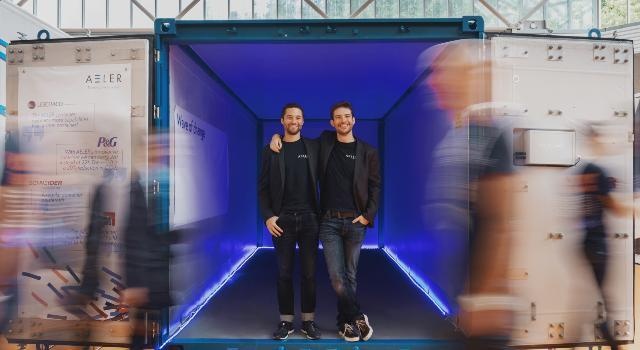
Aeler Technologies, a Swiss-based engineering technology company focused on revolutionizing the traditional Marine container industry by combining Internet of Things (IoT) technology and innovative box composites, not only reflects the profound impact of technology on the traditional industry, but also heralded an important leap forward in the field of Marine logistics.
Aeler Technologies, a spin-off of the Ecole Polytechnique Federale de Lausanne (EPFL), is rooted in EPFL's scientific strength and cutting-edge technology. The joint founding of David Baur and Naik Londono not only reflects the deep accumulation of the two founders in the field of advanced composite materials and Internet of Things technology, but also indicates that Aeler Technologies will bring breakthrough innovation in these two fields. The fiberglass and resin composites developed by David Baur during his master's program at EPFL's Advanced Composites Processing Laboratory (School of Engineering) are a landmark technological achievement. This composite material not only has excellent mechanical properties, can withstand high loads, and its lightweight characteristics make it have a wide range of applications in many fields such as transportation and construction. This discovery by David Baur provides a solid material foundation for Aeler Technologies' Smart Marine container project. Combined with the Internet of Things, Aeler Technologies' smart shipping containers not only enable real-time monitoring and remote management of the status of cargo transport, but also significantly improve the payload and insulation performance of the containers by using this high-performance composite material. This innovative design not only improves the transportation efficiency and economy, but also ensures the safety and stability of goods during transportation.
80% of the world's cargo is transported by sea, but there have been few major innovations in sea containers in the past 60 years, and existing steel containers have problems with moisture resistance, heat insulation, load capacity, and transport conditions and cargo security. The internal conditions of existing shipping containers (such as temperature, humidity, vibration, etc.) and the safety of goods are often difficult to be timely and accurate grasp, and the delayed information may cause problems in the transportation process to be difficult to find and deal with in time, increasing the risk and uncertainty of cargo transportation.
As a spin-off company of EPFL, Aeler Technologies not only inherits EPFL's research spirit and innovation tradition, but also makes full use of EPFL's rich resources in research, education and industrial cooperation. This enables Aeler Technologies to receive strong support in technology research and development, product testing, marketing, etc., so that its innovation results can be translated into practical applications faster, and bring revolutionary changes to the global maritime logistics industry.
The Internet of Things technology has been widely used in smart shipping containers to achieve real-time monitoring. Aeler's smart shipping containers have a variety of built-in sensors to monitor key parameters such as temperature, humidity, vibration, and pressure of the cargo in real time, and transmit these data to the cloud server or user terminal in real time. This real-time monitoring capability greatly improves the safety and transparency of cargo transportation, allowing shippers, carriers and interested parties to keep abreast of cargo status and respond to potential problems in a timely manner. Through the Internet of Things technology, the intelligent container of Aeler supports remote locking, unlocking, temperature regulation and other functions to achieve remote management and control of the container. This not only improves operational efficiency, but also reduces manual operation costs and risks. It is convenient for data analysis and prediction. Through big data analysis, the collected massive data can predict the problems that may be encountered during the transportation of goods, such as temperature fluctuations, cargo damage risks, etc., so that measures can be taken in advance to intervene and ensure the safety of goods. At the same time, these data can also provide strong support for optimizing transportation routes and improving loading efficiency.
Advanced box composite materials also play a huge advantage. Increased payloads and containers made of lightweight but strong composite materials can reduce their own weight without sacrificing structural safety, allowing more cargo to be loaded and improving transport efficiency and economy. For goods requiring special temperature control (such as medicines, food, etc.), Aeler containers use advanced thermal insulation materials to effectively reduce the impact of the external environment on the temperature inside the box and ensure that the goods maintain a stable temperature environment during transportation. Improve corrosion resistance and durability, composite materials usually have excellent corrosion resistance and durability, and can resist the erosion of harsh environments such as seawater and salt spray, extend the service life of containers, and reduce maintenance costs.
Currently, Aeler operates in more than 30 countries and has partnerships with 11 companies, including Procter & Gamble. In 2024, the company plans to launch thousands of containers and complete the transportation of goods worth 350 million Swiss francs. Aeler Technologies' smart Marine container solutions are bringing unprecedented change to the traditional Marine industry. It not only improves the safety and efficiency of cargo transportation, but also brings more business value to the industry through data analysis and prediction capabilities. With the continuous progress of technology and the gradual reduction of costs, intelligent shipping containers are expected to become the mainstream trend in the field of shipping logistics in the future, and promote the intelligent and green development of the entire industry.

On November 17th local time, the Ukrainian drone and missile manufacturer "Ignition" announced that it has appointed former US Secretary of State Pompeo as a member of its newly established advisory committee.
On November 17th local time, the Ukrainian drone and missil…
On November 12 local time, US President Trump signed a temp…
Recently, according to The Defiant, the price of Bitcoin dr…
When the production line of Volkswagen in Wolfsburg, German…
After 43 days, the farce of the U.S. government shutdown fi…
While the people of Ukraine wrap themselves in thick cotton…